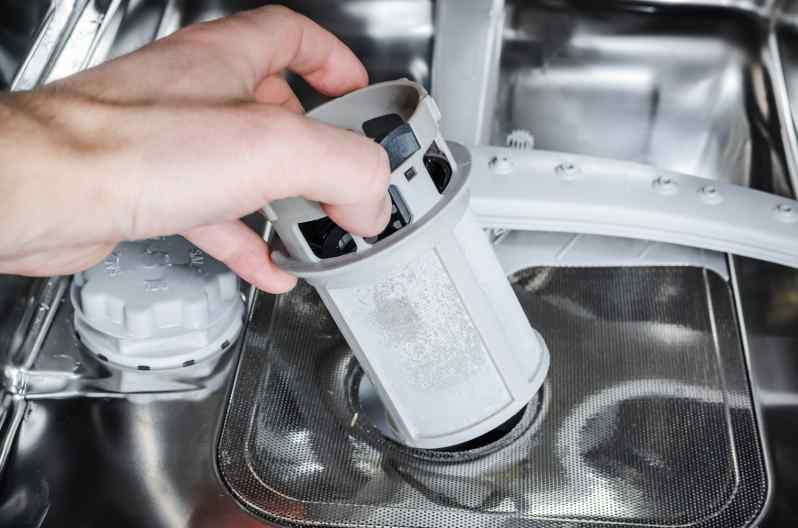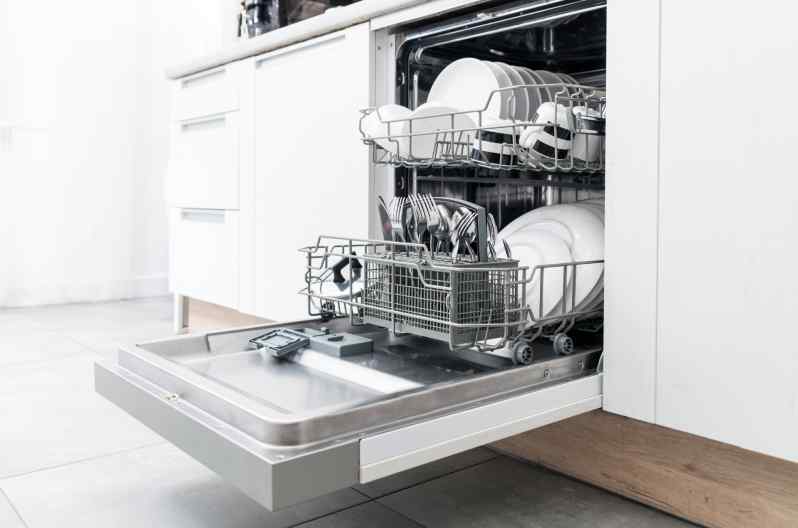One of the most used appliances in any home, most people never worry about their dishwasher causing damage. However, a leaking dishwasher is a common cause of kitchen floods. Whether your dishwasher overflows or leaks through the door, it can leave your kitchen a wet, soapy mess. We explain how to clean up a leaking dishwasher fast to limit the damage. Plus, we look at the most common reasons for dishwasher floods and overflows.
How To Cleanup Dishwasher Leaks or Floods in Your Kitchen
The key to preventing damage after a leaking dishwasher or overflow is to clean up quickly. Start by removing the water, then dry and disinfect your kitchen. If needed, make repairs or replace the dishwasher to prevent future leaks.
1. Turn off the Water and Electricity
The first step to cleaning up a dishwasher flood is to turn off the water and electricity. Turning off the water will stop your dishwasher from leaking or overflowing. Shutting off your electricity will prevent electrocution, especially if the water is near electrical outlets.
2. Soak up as Much Water as Possible
Once you’ve shut off the water and power, soak up as much water as possible. Use a mop or towels to soak up water and soap. If the dishwasher is still leaking, use thick towels or blankets to keep the water from spreading. If you have a basement or crawlspace below your kitchen, check to see if water leaked through the ceiling as well.
3. Clean Out Your Cabinets
Water from a dishwasher flood can ruin the food in your cabinets or pantry fast. You should throw away wet boxes of food or anything that looks damaged. Then use a towel to wipe down cans and plastic items. Put wet pots and pans in the sink and hand wash them later.
4. Dry Out Your Flooded Kitchen
Next, use fans and dehumidifiers to dry your kitchen. While household fans will work, they aren’t meant to dry out a flooded kitchen. To dry your kitchen faster, rent high-volume fans and dehumidifiers from an equipment rental company. Position fans throughout the kitchen with the dehumidifier in the middle of the room.
5. Remove Damaged Items
Depending on the size of the kitchen flood, you may need to throw away damaged cabinets, flooring, or drywall. An overflowing dishwasher can also damage the subfloor or even the ceiling below. Remove anything that is damaged or too wet to save.
6. Repair or Replace Your Dishwasher
Depending on what caused the dishwasher leak, you will need to repair or replace it. While clogged drains and worn-out gaskets are easy to fix, you should replace your dishwasher if the tub is damaged.
7. Disinfect and Deodorize Your Kitchen
After any leak or flood, you should disinfect your kitchen to prevent mold and bacteria. Mix one cup of household bleach in a gallon of water and wipe down anything that got wet from your leaky dishwasher. To deal with musty smells, you can air out your kitchen by opening a few windows. For really strong odors, you can use baking soda as well.
8. Restore and Rebuild Your Kitchen
Finally, you can rebuild your kitchen. For small kitchen floods, you may not need to do anything. However, you may need to replace the flooring or install new cabinets after a more severe leak.
Talk to a local pro now. Certified Restoration Local water cleanup specialists offer 24-hour service and fast, free quotes.
Why Is My Dishwasher Leaking From the Bottom or Door?
Unfortunately, there are several reasons why your dishwasher is leaking from the bottom or through the door. These leaks can be minor or cause major overflows or floods. While small leaks through the door are common, a leaking dishwasher can flood your kitchen or even other rooms in your home.
Broken or Leaky Door
A broken or leaking dishwasher door is the number one cause of a flooded kitchen. The latch and hinges tend to loosen over time, so the door doesn’t form a good seal.
Worn Out Rubber Gasket
Also called a rubber seal, the gasket forms the watertight seal between the door and the dishwasher tub. However, the gasket can wear out over time and cause a dishwasher leak or overflow. You should clean the gasket every three months and replace it if it’s dried out or cracked.
Faulty Water Inlet Valve
The inlet valve controls the flow of water during the wash cycle. If it fails, the water will not shut off properly and it can eventually leak out of the dishwasher.
Loose Hose Connections
Your dishwasher has two hose connections, typically underneath or behind the unit. One brings in clean water, while wastewater flows away in the other. A loose connection from either hose can cause a dishwasher leak or even a flooded kitchen.
Damaged Tub
A damaged tub is another cause of a leaky dishwasher. The tub is the main body of your dishwasher and contains the spray nozzles and dish racks. A buildup of soap can corrode the bottom of the dishwasher tub over time and cause your dishwasher to leak underneath.
Using the Wrong Soap
You should only use dishwasher detergent because other soaps can cause leaks or floods. This is especially true of liquid dish soap. It will cause a thick foam that can leak out of your dishwasher. If you pre-soak dishes in the sink with dish soap, rinse them completely before loading your dishwasher.
Clogged Drain or Filter
A clogged drain or filter can also cause a dishwasher to flood or overflow. Although most clogs are caused by food particles, but a mineral buildup can cause a problem too. Check your dishwasher filter after every second wash cycle and clean your drain every three months to prevent your dishwasher from leaking from underneath.
Problems With the Float Bulb
Similar to the float in your toilet, the float bulb keeps your dishwasher from overfilling. Not only can the float wear out, but food can build up underneath it. In either case, the float won’t work right, and it can cause a kitchen flood.

How To Prevent a Dishwasher Overflow or Flood
The best way to prevent a leaking dishwasher is to follow the instructions, use the right soap and do regular maintenance. Here are a few tips to keep your dishwasher from leaking or overflowing.
- Load It Properly: One of the easiest ways to prevent a leaky dishwasher is to load it properly. Follow the instructions for loading your dishwasher to avoid blocking the sprayers.
- Use the Right Soap: Always use the right kind and amount of soap for your dishwasher. Using too much or the wrong kind of soap will create too much foam and cause leaks.
- Clean Your Dishwasher: This may sound odd, but you need to clean your dishwasher every so often. You should clean the seals, gaskets, and sprayer nozzles every three months. You should also flush or change the filters too.
- Check the Supply and Drain Lines: Your dishwasher has two hoses, the clean water supply line and the wastewater drain hose. Since they can leak and cause a kitchen flood, you should check them every six months.
- Only Run it While You Are Home: One of the easiest ways to prevent a dishwasher leak or flood is to only run it when you are home and awake. If there is a problem, you can limit or even prevent damage.
Does Insurance Cover a Leaking Dishwasher or Floods?
Most insurance policies will cover damage caused by a leaking dishwasher or flood if there is a sudden malfunction. However, they may deny your claim if your dishwasher is damaged or has caused problems before.
For this reason, remember to clean your dishwasher and check the supply and drain hoses. If you do have a leak or overflow, repair or replace your dishwasher right away.
If your kitchen floods after a dishwasher overflow or leak, document the damages for your insurance claim. With a severe kitchen flood, call a water cleanup specialist first and then follow up with your insurance agent.
If you have a dishwasher overflow, floor, or leak, let Restoration Local clean up and repair the damage. Call 1-855-576-3608 now to talk with our contractor in your area. They offer 24-hour service and will provide a free estimate for water damage restoration services.





